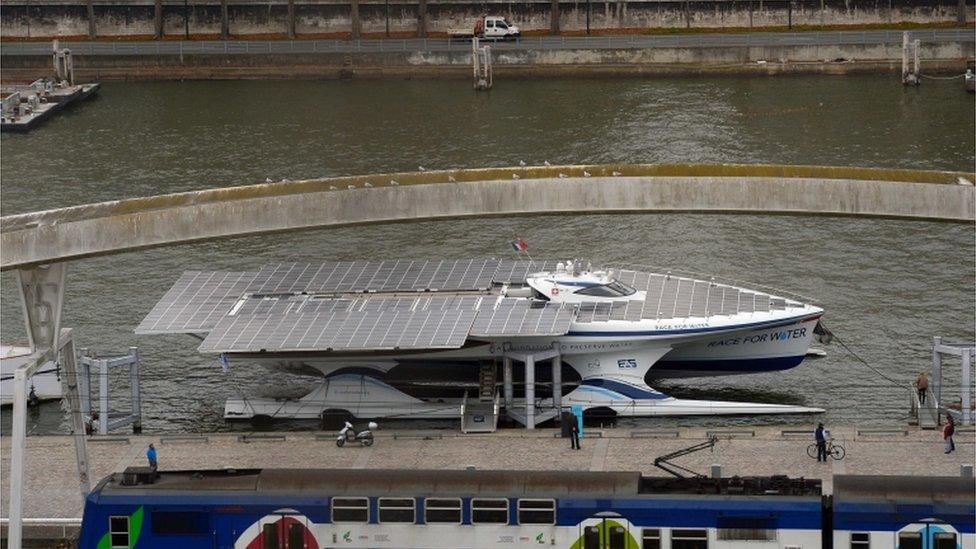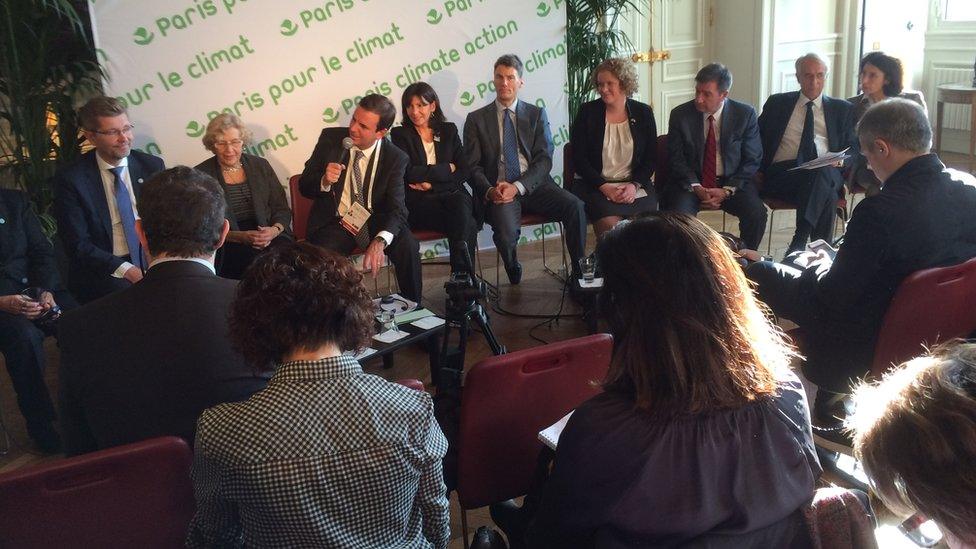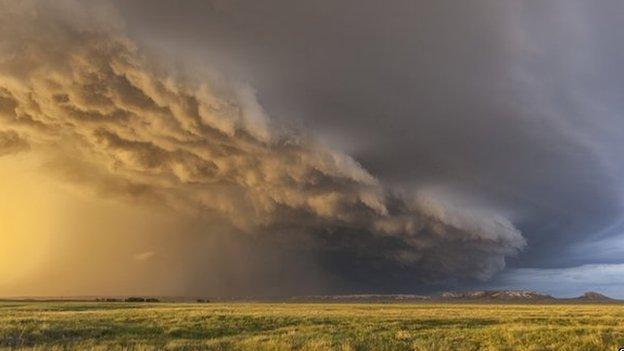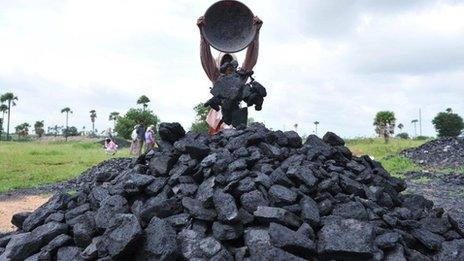COP21: City mayors discuss green solutions
- Published

The world's largest solar boat is currently moored on the Seine
Cities could use water from rivers and the sea to stay cool as the climate heats, city mayors have been told.
Carbon emissions from air-conditioning are expected to soar as temperatures climb and people become richer.
But at a global mayors summit, Paris is showcasing a simple technology using water piped from the Seine to cool apartments near the Champs Elysees.
London Mayor Boris Johnson said he wanted London to follow suit by cooling buildings using water from the Thames.
"I don't like to admit it - but the French are ahead of us on this," he confessed.
The system works by taking water from the river and piping it round people's homes like ordinary piped water air conditioning. In summer a heat pump is used to make the water even cooler by employing technology similar to a fridge.
The mayors meeting in Paris City Hall is timed to coincide with the UN climate summit. It brings together half of the 80 mega-city mayors who are working together to tackle climate change.

Global majors in Paris City Hall
The chairman of the group, Eduardo Paes, Mayor of Rio, said the mayors represented 600m people and a quarter of the global economy.
"We can be very effective," he said. "Sometimes governments move slowly - we can often move more quickly."
The mayors said they had learned from each other to spread green solutions round the world. They claim to have collectively made 10,000 climate initiatives since 2009.
They spoke about their favourite initiatives:
Gregor Robertson, Mayor of Vancouver, said that in car-dominated North America more than half of people were now using what he calls "active transport" - walking, cycling and mass transit.
Frank Jensen, Mayor of Copenhagen, said 99% of homes in his city were warmed by district heating, in which a network of premises are served by one efficient central heating system. He said this had more than halved carbon emissions since 1995.
Clover Moore, Mayor of Sydney, said the city had saved cash and cut emissions by 40% after she learned about low-energy lighting from the Mayor of Los Angeles. "Working together, it's powerful action across the world," she said.
Alfred Okoe Vanderpuije, Mayor of Accra, said Ghana was being plagued by severe and erratic rains which he believed were linked to climate change. "Usually our rains are in July and Feb… but it's raining now." Tough decisions had to be made, he said, to clear slum dwellers so water courses could be unblocked.
Karin Wanngård, Mayor of Stockholm said the city would be fossil fuel free by 2040. A new city area with 12,000 houses would generate more energy than it uses by 2030. "Mayors can really make a difference - we can push boundaries," she said.
Boris Johnson's team said since the Mayor was elected in 2008, carbon emissions in London were down by 14%, even though population had swelled.
He said a major preoccupation was to find ways of finding a low-carbon way to provide the heating and cooling from natural gas, which made up nearly 50% of the city's emissions.
Darren Johnson, Green member for the London Assembly, told BBC News: "On the whole Boris Johnson has been a real disappointment. He has expressed climate sceptic views and failed to meet most of the targets in his (climate) strategies."
The global commission advised by Lord Stern concluded recently that climate change could only be tackled if new cities to house a burgeoning population could be planned less like Los Angeles and more like Paris.
Climate change remedies 'affordable'
Follow Roger on Twitter @rharrabin

UN climate conference 30 Nov - 11 Dec 2015

COP 21 - the 21st session of the Conference of the Parties - will see more than 190 nations gather in Paris to discuss a possible new global agreement on climate change, aimed at reducing greenhouse gas emissions to avoid the threat of dangerous warming due to human activities.
Explained: What is climate change?
In video: Why does the Paris conference matter?
Analysis: Latest from BBC environment correspondent Matt McGrath
More: BBC News climate change special report
- Published16 September 2014

- Published2 December 2015
